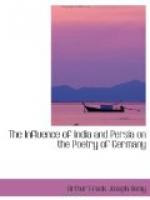This very striking thought, as is well known, is extremely common in Persian poetry. To cite from Hafid (H. 459. 4):
[Arabic]
[Arabic]
“The day when
the wheel (of fate) from our dust will make jugs,
take care! make our
skull (lit. the cup of the head) full of
wine."[150]
Some of the poems are versions, more or less free, of Hafid—passages, e.g. “Die verloren gegangene Schoene” (p. 290, H. 268), “An die Schoene” (p. 308, H. 160, couplets 2 and 5 being omitted), “Beschwichtigter Zweifel” (p. 310, H. 430. 6), “Das harte Wort” (p. 350, H. 77. 1 and 2). Sometimes a theme is taken from Hafid and then expanded, as in “Die Busse” (p. 346), where the first verse is a version of H. 384. 1, the rest being original.
Of course, reminiscences of Hafid are bound to be frequent. We shall point out only a few instances. “Nicht solltest du so, O Rose, versaeumen die Nachtigall” ("Stimme der Sehnsucht,” p. 256) is inspired by a verse like H. 292. 2:
[Arabic]
[Arabic]
“O rose, in thanks
for that thou art the queen of beauty, display
no arrogance towards
nightingales madly in love.”
In “Zum neuen Jahr” (p. 260) the last lines:
Trag der Schoenheit Koran
im offenen Angesicht,
Und ihm diene das Lied Hafises
zum Kommentar
are a parallel to H. 10. 6:
[Arabic]
[Arabic]
“Thy beautiful
face by its grace explained to us a verse of the
Quran; for that
reason there is nothing in our commentary but
grace and beauty.”
The opening lines of “Schmuck der Welt” (p. 260):
Nicht bedarf der Schmink’
ein schoenes Angesicht.
So bedarf die Liebste meiner
Liebe nicht
are distinctly reminiscent of H. 8. 4:
[Arabic]
[Arabic]
“Of our imperfect
love the beauty of the beloved is independent.
What need has a lovely
face of lustre and dye and mole and line?”
Like Hafid (H. 358. 11; 518. 7 et passim) Rueckert also boasts of his supremacy as a singer of love and wine ("Vom Lichte des Weines,” p. 273). Finally in “Frag und Antwort” (p. 258) he employs the form of the dialogue, the lines beginning alternately Ich sprach, Sie sprach, just as Hafid does in Ode 136 or 194. The “Vierzeilen” (p. 361), while they have the ruba’i-rhyme, are not versions. Only a few of them have an Oriental character. Completely unoriental are the “Briefe des Brahmanen” (p. 359), dealing with literary matters of contemporary interest.[151]
The Oriental studies which Rueckert continued to pursue with unabated ardor were to him a fruitful source of poetic inspiration. They furnished the material for the great mass of narrative, descriptive and didactic poems which were collected under the titles Erbauliches und Beschauliches aus dem Morgenlande, and again Morgenlaendische Sagen und Geschichten, furthermore Brahmanische Erzaehlungen, and lastly Weisheit des Brahmanen. We shall discuss these collections in the order here given.




